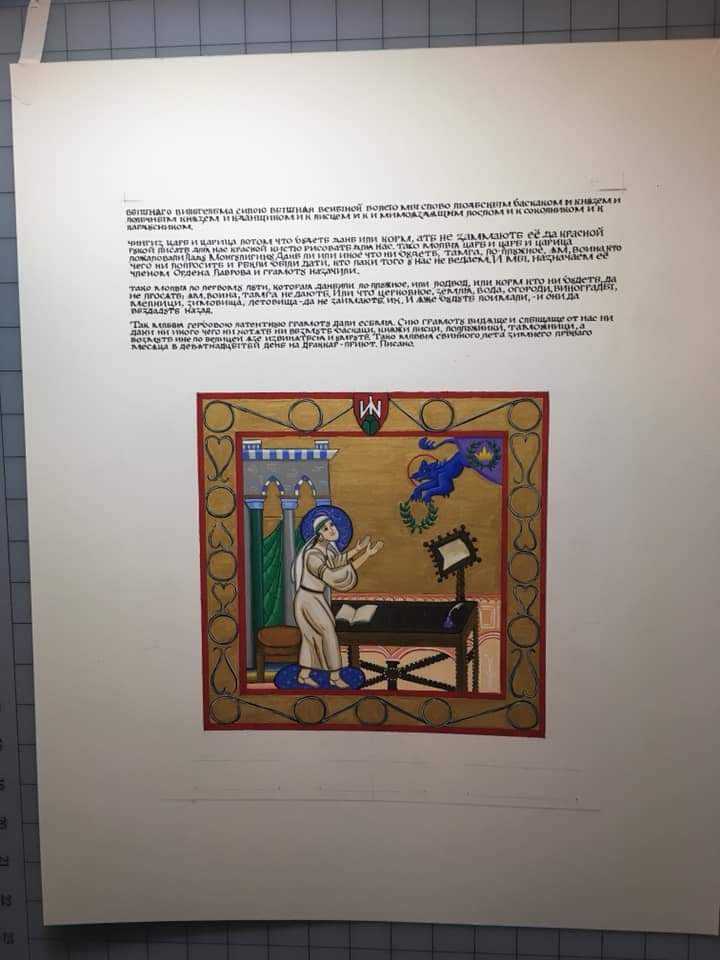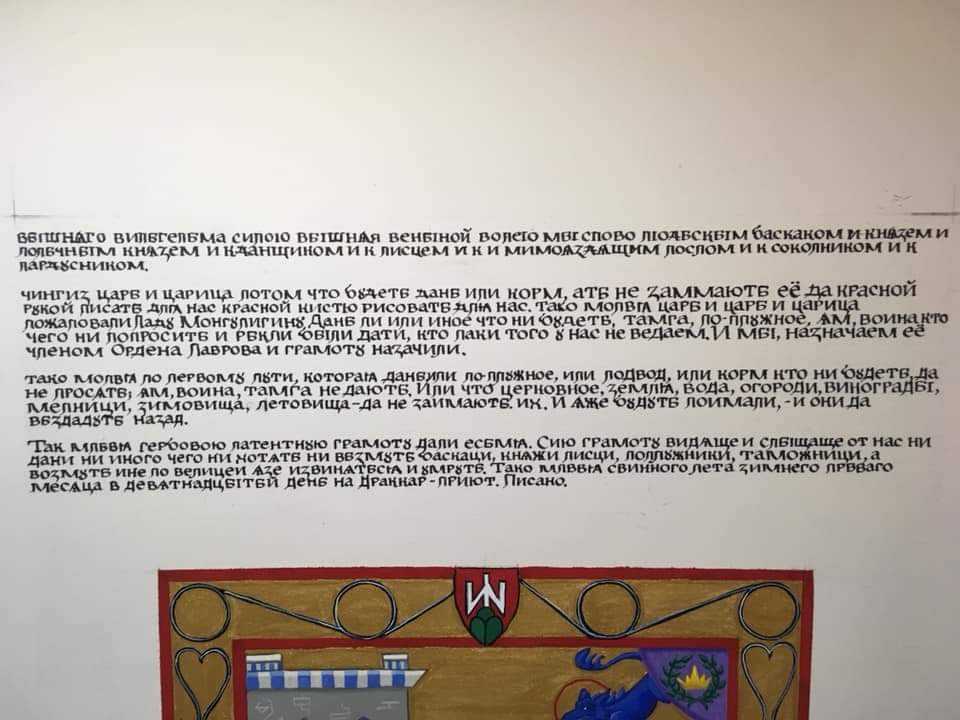This is probably my favorite text that I’ve done – at the very least, it’s tied for first place with Ruslan’s Tyger. Lada is a friend, and one of the few SCAdians who, like me, is a native Russian speaker. So this text had to be just right.
Lada’s persona is specifically set during the Mongol occupation of Russia, so I went looking for a source that combined both. Unfortunately, the vast majority of documents associated with the Mongols are written in Mongolian, using the Uyghur alphabet, or in Chinese. Neither are languages I speak.
After some research, I came across a Mongolian legal document known as a Jarlig or Jarlig. These were legal documents that were used, among other things, to grant legal powers to subsidiary nobles under the Mongol rule. They were one of the few documents that were regularly translated into Russian, so that the Russian populace could read these grants of legal authority. Unfortunately, after the Mongol rule ended, these Jarligs were seen as signs of collaboration with the Mongol occupiers, so most of the noble families, monasteries, etc. that had previously received them, destroyed them to hide the evidence.
Only six of these Russian-language Jarligs appear to have survived. A scholarly work I found online had the text for one of them. This, then, was my source.
The original document is the “Jarlig of Mengu-Temir”, d. August 1, 1267, found in “Landmarks of Russian Law” Vol 3 “Period of Centralization of Russian Government, 14-15 C” edited by L. V. Cherepnina, Moscow, 1955, p. 467. This document was, primarily, a grant of tax relief to a Metropolitan of the Russian Church, excusing him (or more likely the church/monastery he led) from various taxes presumably as a reward for cooperating with the Mongol rulers. In exchange, the Metropolitan was expected to pray for the souls of the Mongolian rulers.
And yes, the list of taxes is authentic. Taxation in medieval Russia was very, very complicated.
Russian Text:
Вышнѧго Вильгельма силою вышнѧя Веныной волею мы слово людьскым баскаком и кнѧзем и полъчным кнѧзем и к данщиком и к писцем и к и мимоѧздѧщим послом и к соколником и к пардγсником.
Чингиз царь и царица потом что бγдеть дань или корм, ать не заммають её да красной рγкой писать для нас красной кистю рисовать для нас. Тако молвя царь и царица пожаловали Ладγ Монгγлигинγ Дань ли или иное что ни бγдеть, тамга, по-плγжное, ѧм, воина кто чего ни попросить и рькли были дати, кто паки того γ нас не ведаеть, вси ведаем. И мы, назначаем её членом Ордена Лаврова и грамотγ назачили.
Тако молвя по первомγ пγти, которая дань, или по-плγжное, или подвода, или корм кто ни бγдеть, да не просѧть; ѧм, воина, тамга не дають. Или что церковное, земля, вода, огороди, винограды , мелници, зимовища, летовища — да не заимають их. И ѧже бγдγть поймали, — и они да въздадγть назад.
Так млъвя, гербовою патентнγю грамотγ дали есьмя. Сию грамотγ видѧще и слышаще от насни дани ни иного чего ни хотѧть ни възмγть баскаци, кнѧжи писци, поплγжники, таможници, а возмγть ине по велицеи ѧзе извинѧться и γмрγть. Тако млъвя свинного лета зимнего пръваго месѧца в девѧтнадцытый день на Драккар- приют. Писано.
English Translation:
By the eternal strength of Wilhelm and the eternal will of Vienna, we send our word to the people, governors, princes, lesser princes, tax collectors, scribes, ambassadors, falconers, and leopard hunters.
For she has written for us with a fair hand, and drawn for us with a fair brush, do we, Great Tsar and Tsaritsa wish to trouble her with taxes and duties no longer. Therefore, do we, the Tsar and Tsaritsa say that Lada Monguligin will no longer be subject to duties of any kind, or taxes, or plow taxes, or transport obligations, or conscription, and none shall ask these of her for now all shall have heard of this. Further, We hereby appoint her a Companion of the Order of the Laurel and orders this writing.
Therefore we say, as we said before, that those same duties, taxes, plow taxes, or water duties, or in-kind duties, none shall ask of her, and that transport obligations, or conscripts, or taxes, none shall she owe. Nor church taxes, nor land taxes, nor water taxes, nor vegetable taxes, nor grape taxes, nor mill taxes, nor winter taxes, nor summer taxes – none shall take from her. And if one is caught taking such – so he shall return it.
Having said this, we grant her this Patent of Arms stating the same. And having seen and heard said patent from us, neither duty nor aught else from her shall be demanded by the governeros, princes, scribes, plow-tax collectors, nor customs-men, and if any shall take, they shall apologize and die. Thus our word is heard in the year of the Boar, in the first month of Winter, on the 19th day, or on the 23rd of February Anno Societatas 53, in our Barony of Dragonship Haven. And so it is written.
Images:
Calligraphy and Illumination by Kayleigh McWhyte.

